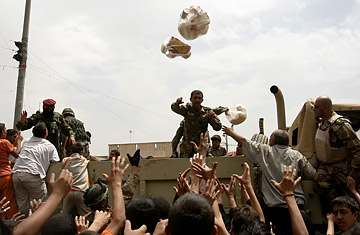
Iraqi soldiers distribute food among the residents of the Shiite enclave of Sadr city in Baghdad, Thursday, May 8, 2008.
U.S.-back Iraqi forces are gearing up for a new push deeper into Sadr City that could worsen fighting and displace hundreds, a government spokesman in Baghdad said. "There will be a big offensive soon," said Iraqi government spokesman Tahseen al-Sheikhly. He did not say when the operation would go forward. In east Baghdad the Iraqi government has readied two stadiums and one former military base to serve as camps for Sadr City residents who may be forced to flee the fighting, al-Sheikhly said. "We don't want any losses in the civilians," said al-Sheikhly.
More than 1,010 have died in Sadr City since fighting erupted at the end of March, according to Iraqi government figures offered by al-Sheikhly. Another 2,930 have been wounded, he said. Ongoing fighting continues to worsen the crisis in the vast Shi'ite slum, the Baghdad stronghold of the Shi'ite Mahdi Army militia. Mohammed Kamel Hassan, a volunteer organizer in Sadr City for the Iraqi Red Crescent Organization, said up to 500 families have already been displaced from areas around the fighting in recent days. "We have a big movement," said Hassan, whose organization is working closely with the Iraqi government on new emergency plans. "The situation is very bad."
U.N. estimates say that up to 6,000 people have already fled their homes in Sadr City while another 150,000 remain essentially trapped in areas locked down by military forces. Al-Sheikhly and Hassan said at present no evacuation of any part of Sadr City is underway. But residents in areas of heavy fighting said Iraqi army troops were urging civilians to move to the shelter of nearby stadiums with announcements over loudspeakers.
Most of the fighting thus far has been confined to the southeast edge of Sadr City, where Iraqi forces backed by U.S. troops have established some positions as part of the offensive. It remains unclear where U.S. or Iraqi troops may go into Sadr City as part of a new push. But any significant thrust by U.S. and Iraqi troops into the densely populated area is likely to bring intense resistance from guerrilla fighters of the Mahdi Army, which is loyal to Shi'ite cleric Muqtada al-Sadr.
The siege of Sadr City, now more than a month old, represents a significant shift politically for Iraqi Prime Minister Nouri al-Maliki, who had aligned himself with the Sadrists for a time. But since March, Maliki has kept up attacks on Sadr's militiamen in Baghdad and southern Iraq. Early setbacks such as Iraq army defections and battlefield defeats in Basra have so far not seemed to dim Maliki's determination to continue the fight. With reporting by Mazin Ezzat
